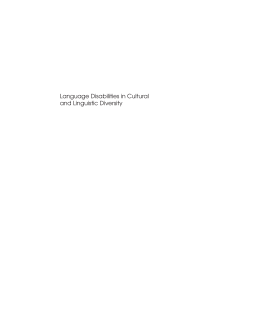
Additional Information
Book Details
Abstract
Language Disabilities in Cultural and Linguistic Diversity takes a critical perspective on traditional bio-cognitive-social approaches to language disabilities – specific language impairment, communication difficulties, dyslexia and deafness. A socio-cultural approach orientates a reinterpretation of research, educational practices and policies in assessment, teaching and intervention. A Vygotskian framework affords repositioning of assessment, learning and development for language disabilities as they are influenced and shaped by experiences of multilingualism, culture, ethnicity and race. The author, rather than present definitive answers, aims to offer new analyses and extend current understanding of linguistic phenomena fraught by dilemmas of disentangling diversity and disability. The volume serves as a source of reflection and inquiry for students, professionals and policy makers in education and health who are interested in disability and language disabilities in multilingual and multicultural contexts.
I must say that it's been difficult for me to put this book down. This is a great book. I like how Martin has interconnected the various strands of research on bilingual children and their clinical management in speech therapy with the underlying sociocultural/sociopolitical subtext of speech services to these children.
Jose Centeno, St. John's University, USA
This book uses Vygotskian and Sociocultural perspectives to explore issues related to Cultural and Linguistic Diversity and language disabilities, and considers a wide range of client groups. It is a very thought-provoking and interesting read which is high on theory and Iowan practicality. (If you want a 'how to' book, this is definitely not for you!) Overall the book is complex to read, but well worth the effort if your caseload includes clients with cultural and linguistic diversity and you have a need for a good grounding in the issues that may arise. It will appeal to therapists already working in this specialist field or those wishing to develop a specialism in this area.
Linda Robinson, a highly specialist speech and language therapist with Barnsley Primary Care Trust
This volume offers a nuanced account of language related disabilities in culturally and linguistically diverse contexts. It invites a critical rethink of key theoretical and methodological issues regarding multilingualism and communication disorders. It also provides practical advice to professionals and parents who have to deal with real-life situations on a daily basis.
Professor Li Wei, Birkbeck College, University of London
This book fills a significant gap in the current literature in an original and stimulating way. Deirdre Martin was among those who recognised at an early stage that professionals such as speech and language therapists and teachers would need to develop better strategies for working with children with communication and interaction needs who were learning English as an additional language.
Tony Cline
Deirdre Martin is Senior Lecturer in the School of Education, University of Birmingham, UK. She has extensive experience as an educator and researcher with children and families with language disabilities in multilingual societies. She was a speech and language therapist in the UK and Peru, co-founded the Royal College of Speech and Language Therapists’ special interest group in bilingualism and has been a specialist professional advisor. She currently leads postgraduate programmes on language disability and dyslexia for professionals working in EAL, EFL and bilingual contexts. She has published and presented widely in the field of language development, disability and bilingualism.
Table of Contents
| Section Title | Page | Action | Price |
|---|---|---|---|
| Contents | v | ||
| Acknowledgements | xiii | ||
| Introduction | xv | ||
| Chapter 1 A Sociocultural Activity Approach: Key Concepts | 1 | ||
| Chapter 2 Provision for Communication Disabilities in Cultural and Linguistic Diversity | 21 | ||
| Chapter 3 Disability and Disabling Culturaland Linguistic Diversity | 43 | ||
| Chapter 4 Bilingual Speech and Language Development and Difficulties | 66 | ||
| Chapter 5 Literacy, Biliteracies and Difficulties with Printed Language | 89 | ||
| Chapter 6 Deafness in Culturally and Linguistically Diverse Communities | 119 | ||
| Chapter 7 Assessment Approaches: Comparison, Product and Process | 147 | ||
| Chapter 8 Learning, Teaching and Intervention | 175 | ||
| Chapter 9 Collaboration as Interprofessional Learning | 202 | ||
| Chapter 10 Parents, Families and Children Working with Professionals | 231 | ||
| References | 255 | ||
| Index | 297 |
